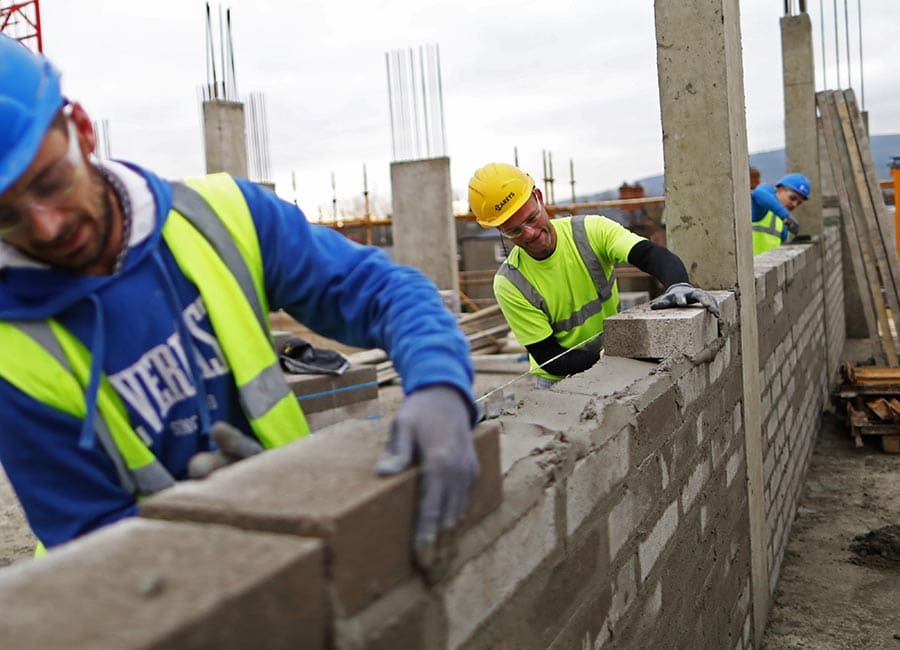It is expected that a total of 28,000 homes will be constructed this year and that 2023 will see "strong" levels of new build completions in the residential sector, according to BNP Paribas Real Estate Ireland.
The 28,000 figure is ahead of government targets and surpasses the 25,000 projection used by the ESRI in research published last week, although it remains short of the estimated 35,000 required per annum to 2030 to alleviate the housing crisis.
Central Statistics Office (CSO) data show close to 21,000 new dwellings were completed during the the first nine months of 2022, although construction activity continues to slow.
Irish construction activity fell for the second month running in November on the back of continued inflationary pressures and resultant weakened demand, the BNP Paribas Real Estate Ireland's latest construction purchasing managers index (PMI) shows.
The headline seasonally-adjusted index declined from 47.4 in October to 46.8 in what was the fastest fall in total activity since July, driven by a rapid decline in housing and civil engineering activity month-on-month.
BNP Paribas Real Estate Ireland said there was anecdotal evidence to suggest that a drop in new orders and a market slowdown were behind the fall in activity, with price pressures an additional factor as new business decreased for the eighth successive month, and at the fastest pace since August.
Input costs continue to rise sharply, and the rate of inflation quickened in November as more than 47% of respondents signalled an increase over the month. Some businesses said energy and fuel prices had a particular impact on their cost burdens.
Lower demand and price pressures caused construction firms to make efforts to reduce stock holdings, resulting in the largest decline in purchasing activity for three months.
"After slowing this summer, residential activity stabilised in September and October," said John McCartney, director and head of research at BNP Paribas Real Estate Ireland.
"But a re-acceleration of input cost inflation, along with slower house price growth, intensified viability challenges in November. This contributed to a sharp contraction in residential activity."
Despite what McCartney described as a postivie short-term outlook for housing completions, the November PMO data indicates that "the flow of new projects has tapered-off.
"In particular, new orders slowed for the eighth successive month and, reflecting this, employment growth stalled. The reduction in early-stage building work is dragging on overall activity and threatens to impact on housing completions later in the cycle."
Employment levels were broadly unchanged as companies were reluctant to take on additional staff, and the stall in hiring coincided with a drop in confidence with regards to the year-ahead outlook for activity.
Sentiment was down to a three-month low amid concerns of a wider economic downturn and the impact this will have on workloads, BNP Paribas Real Estate Ireland said.

On balance, however, firms were optimistic that activity will increase over the coming year, with some expecting housing demand to support growth.
Supply-chain disruption remained a feature of the latest survey, with lead times lengthening markedly again, but the rate of deterioration in vendor performance was the softest since February 2020.
Construction firms increased their usage of sub-contractors for the third month running and to the greatest extent since February, but sub-contractor availability continued to decrease and rates charged rose rapidly.
"Given the time it has taken for residential completions to reach current levels, any prospect of back-sliding is concerning. But several factors may help ease viability challenges in the longer run," McCartney said.
"Two new government initiatives – the First Home Scheme, which was introduced in July, and the relaxation of mortgage rules from January – should facilitate builders to sell homes at higher prices.
"Meanwhile agents have reported that site values are beginning to adjust downwards. Perhaps reflecting these positives, the number of building firms expecting to be busier in a year’s time still exceeds the number expecting to be quieter.”
(Pic: Getty Images)











